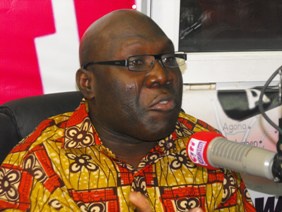
Minister for Lands and Natural Resources Alhaji Inusah Fuseini has pledged government’s readiness to sign onto the Voluntary Principles (VPs) on security and human rights in the extractives sector.
The VPs will provide government and the extractives industry the opportunity to improve on protection of human rights, he said. Signing on will also create goodwill for trade and investment, and improve security for resource communities.
B&FT has gathered that Ghana has advanced in negotiations and discussions toward signing the VPs, and is hoping to be the first to ratify it in Africa ahead of South Africa.
Co-financed and developed by the International Council on Mining and Metals, International Finance Corporation, Global Oil and Gas Industry Association for Environmental and Social Issues, and the International Committee of the Red Cross, the VPs aim to assist extractive companies balance security concerns with human rights.
The VPs are also a useful tool for all governments with an interest in operations of the extractives industry, and can help contribute to the protection of human rights and prevention of conflict.
Alhaji Fuseini was speaking at a stakeholder-workshop in Accra aimed at designing a workable model for security and human rights in the extractive industry.
The workshop -- which was organised jointly by Global Rights, Nigeria, and the Livelihood and Environment, Ghana (LEG) -- both NGOs -- was targetted at exploring the role of civil society organisations in the implementation and application of VPs, and ensuring that Ghana signs on to the principles.
Alhaji Fuseini explained that government is a key promoter and beneficiary of the mining industry, and therefore has a duty to ensure that mining is done responsibly and in a way that does not promote conflict, human rights abuses and insecurity.
“In Ghana, where mining contributes significantly to government revenues for funding local and national development projects, it is important that we support and contribute to processes that will enable us to maximise returns from our mineral resources while ensuring that it does not engender human rights abuses and poverty,” he said.
Abiodun Baiyewu, Global Rights Director for West Africa, explained that through the VPs companies are better able to align their corporate policies, procedures, and internal assessment with internationally recognised human rights principles in the provision of security for their operations.
She said the VPs help companies develop human rights risk-assessment policies and procedures that better anticipate situations in which human rights abuses are most likely to occur.
“The initiative provides a forum for companies to collaborate and learn from one another when developing internal policies and procedures to minimise the likelihood of human rights harm.
“It provides for regular consultations between companies, host-governments and local communities; deals with issues of proportionality and use of force; ensures improved company engagement for protection of human rights by security contractors; and as well supports regularly monitoring progress of investigations into alleged abuses, among other things,” Baiyewu stated.
Richard Adjei-Poku, Executive Director, LEG, expressed the hope that through the workshop much education and awareness will be created among civil society organisations, local non-governmental organisations and the media to enhance advocacy and move Ghana to quickly sign on to the VPs.
“It can also support Government policy objectives, including poverty alleviation, investment, and conflict prevention. Signing the VPs will help reduce conflict in the extractives industry and reduce costs related to insecurity, as well as promote greater transparency and accountability that can improve a country’s investment climate.
“It will also promote a better business environment and provide a platform to engage with multinational extractives companies and civil society in mutual learning and joint problem-solving on security and human rights,” Mr. Adjei-Poku remarked.